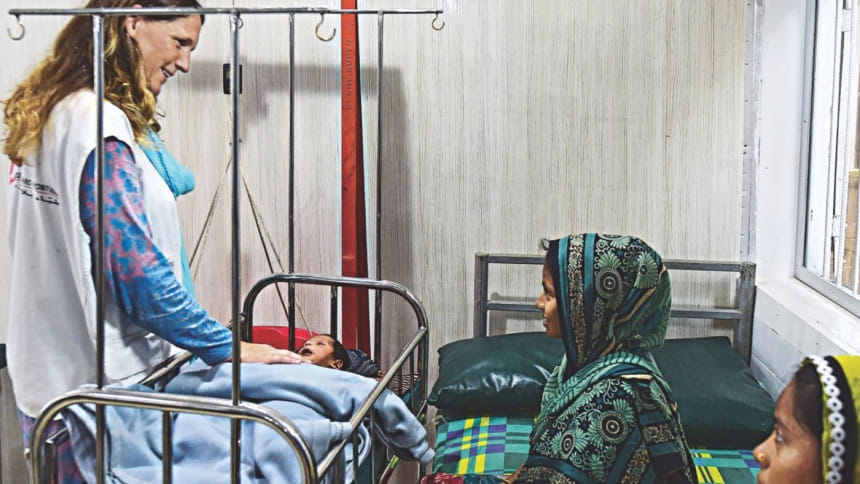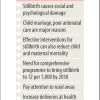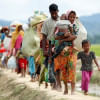Rohingya Refugee Camps: Some 60 babies born a day: UN

Around 60 babies a day are being born in vast refugee camps in Bangladesh, sheltering hundreds of thousands of mainly Rohingya Muslims who have fled Myanmar, the United Nations children's agency Unicef said on Wednesday.
Nearly 700,000 Rohingya fled to Cox's Bazar in Bangladesh in the past nine months after a Myanmar military crackdown that the United Nations, United States and Britain have denounced as ethnic cleansing. Myanmar has denied that any ethnic cleansing occurred.
Unicef said in a statement that since the crisis began more than 16,000 babies had been born in the camps, of which only about 3,000 were delivered in health facilities.
"Around 60 babies a day are taking their first breath in appalling conditions, away from home, to mothers who have survived displacement, violence, trauma and, at times, rape," said Edouard Beigbeder, Unicef's Representative in Bangladesh.
UN Security Council envoys visited the refugee camps in April.
"It is impossible to know the true number of babies who have been or will be born as a result of sexual violence," Beigbeder said. "It is vital that each and every new and expectant mother and every new-born receive all the help and support they need."
Rohingya insurgent attacks on security posts in Myanmar's Rakhine state last August sparked a military operation that Myanmar has said was legitimate. Last November, Myanmar's military released a report in which it denied all accusations of rape by security forces.
A senior Bangladesh health ministry official, who declined to be named due to sensitivity of the matter, said last week that so far 18,300 pregnant women had been identified in the camps and the rough total estimate was around 25,000, reported Reuters.
In March the United Nations launched an appeal for $951 million to help the Rohingya refugees for the rest of the year, but it is less than 20 percent funded.
RAPE VICTIMS
Aid workers are scouring the world's largest refugee camp for pregnant Rohingya rape victims, with a rush of births anticipated nine months after Myanmar forces unleashed "a frenzy of sexual violence" against women and girls from the Muslim minority.
Specialists and Rohingya volunteers are racing against time to find women in the giant camp who are thought to be hiding their pregnancies out of shame, as fears grow that newborns could be abandoned and new mothers may die without care in coming weeks.
Tosminara, herself a Rohingya refugee, has spent months coaxing these women out of the shadows, promising discretion.
"We tell them a password they can use when they arrive at the hospital or health post. The guard then sends the woman directly to the right spot," said Tosminara, who goes by one name.
"They often are shy. Sometimes they are afraid to come forward."
The Myanmar army crackdown last August drove roughly 700,000 Rohingya into Bangladesh and the number of pregnancies resulting from rape is not known.
But UN Assistant Secretary-General for Human Rights Andrew Gilmour said there would "inevitably" be a spike in births soon given the "frenzy of sexual violence in August and September last year".
Marcella Kraay of Doctors Without Borders (MSF) also said "a fair number of pregnancies" were expected.
An estimated 48,000 women will give birth in the camps this year. Those who were raped will be delivering imminently, mostly in secret and without medical care on the floors of bamboo shacks overlooking the Bangladesh-Myanmar border.
Rohingya community leader Abdur Rahim said he knew two women personally who were raped by soldiers and due within the month. He had heard rumours of many others in a similar position, he added.
"The Myanmar military raped them. These babies are... evidence of their crimes," he told AFP.
TRAUMATISED AND ALONE
Tosminara says she is trying her best to find these women in the heaving camps. But volunteers must contend with a deep-rooted stigma that keeps many from revealing their ordeal.
"Sometimes neighbours say 'don't do anything, it will humiliate you further'. So they don't want to come," said Nurjahan Mitu, a doctor who trains midwives through a UN Population Fund programme.
Many have sought clinical help to terminate pregnancies -- legal in Bangladesh up to 12 weeks.
Others have resorted to underground options resulting in "complicated, incomplete abortions", said MSF midwife Daniela Sofia.
The UN's Gilmour, who toured the camps in March, said girls as young as 14 were self-inducing abortions.
Sofia, the midwife, assisted a 16-year-old with an abortion after the teenager arrived at her clinic in secret, terrified that her family would find out.
She said the girl was pregnant after being gang-raped by Myanmar soldiers, but had no one to support her through the trauma.
"Nobody knew about the rape. Her family were not aware of it," Sofia told AFP.
More than half the Rohingya who have fled into Bangladesh are women and girls.
Children are seen everywhere but adolescent girls are largely invisible, many kept indoors by families concerned for their welfare, experts say.
Experts are concerned that families could forcibly marry off teenage girls to cover up a pregnancy.
Others fear that newborns could be abandoned.
MSF alone treated 311 rape victims -- women and girls aged between nine and 50 -- between August and March but Kraay said this was "the tip of the iceberg".
On top of the refugees' accounts, UN Special Representative on Sexual Violence in Conflict Pramila Patten said rape was used as a "calculated tool of terror" to force the Rohingya out of Myanmar.

 For all latest news, follow The Daily Star's Google News channel.
For all latest news, follow The Daily Star's Google News channel. 








Comments